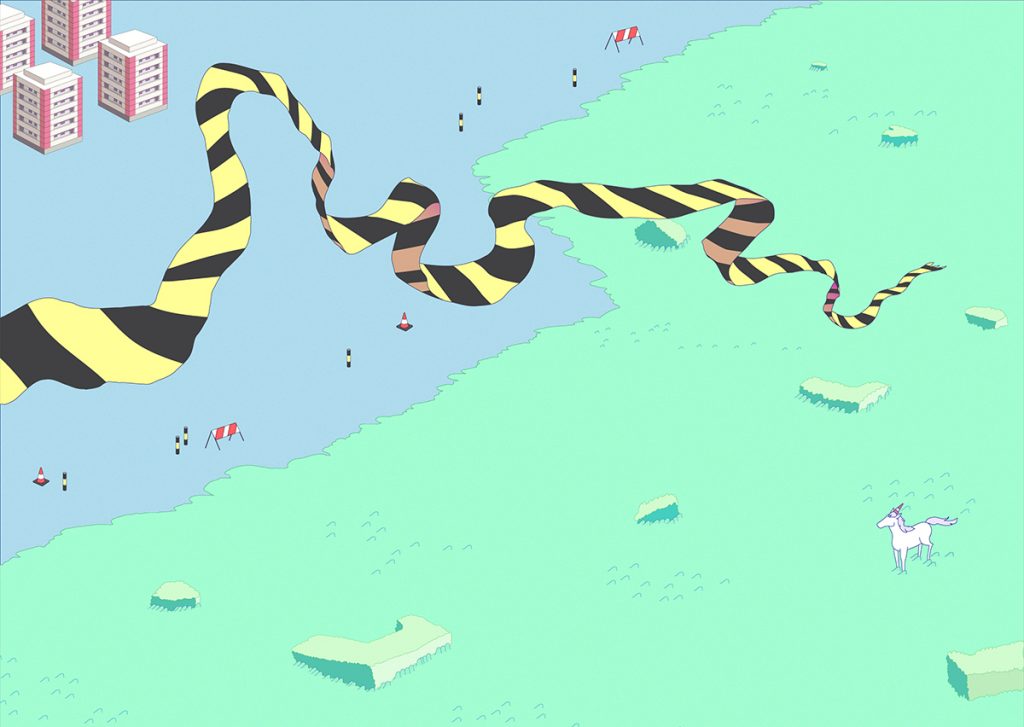Open call:
What Could Should Curating Do educational program 2023/2024
Duration of the program: two months in 2023 and one month in 2024
Applications for 2023/24 are open now
Deadline for submission: April 7th 2023
We will reach shortlisted candidates for interviews between April 10th and April 15th 2023

O.: The Making Of An Unsplit Garden graphic novel work in progress
Nebojša Yamasaki Vukelic
From 2023/24, we are inviting you to collectively research, think, practice and imagine a format of and art institution that is ethically and economically sustainable. We invite you to discover with us what it means when an art institution becomes the custodian of the land.
Canadian indigenous scholar Donald Dwayne reminds us that issues of climate change and sustainability are not problems that science and technology can solve. They are problems of cultural and spiritual origin. We change things not by telling people what they should do but by changing the way they live. The way we live.
What Could Should Curating Do from 2023 is starting a self-reflective process developing a model of institution between urban and rural ecologies connected to the plot of land in central Serbia with the question: What does it mean for an art institution to become the custodian of the land? What are the sustainable practices that reflect the practice of caring for the land and caring for culture? These questions will be at the core of this educational program.
This self-reflective process will be realised through an educational program and the long-term engagement of the program’s mentors, invited collaborators, educational program participants, local communities, WCSCD and alumni.
Our partners and mentors are INLAND (Madrid, Spain), Casa delle Agriculture (Puglia region, Italy), Green Network of Activist groups (ZMAG) [Zagreb, Croatia], Zoma Museum (Addis Ababa, Ethiopia), Madeleine Collie (Food Art Research Network), Manuel Borja-Villel (Museo Reina Sofia), Škart Collective (Belgrade, Serbia), among others. We will be accompanied by Milica Bilanovic (artist, currently based in Tuzla), Jelica Jovanovic (architect, based in Belgrade) and Sergio Montero Bravo (architect, based in Stockholm).
The program is designed to explore different ways of inhabiting and interacting with the biosphere and territory, through mechanisms of education, commissions, and community engagement with artists, curators, local youths, and farmers in the process.
The first stage of the program will include historical research and mapping practices of cultural workers, who have been developing relationships with the rural as an integral part of their practice, which will later take the form of a publication. The first stage of the program also includes a number of workshops with mentors, community and collaborators.
The second stage will focus on practicing situated and embodied knowledge that the place has given to us and creating collective orientations towards the future. We will practice, fail, learn from failures and try again.
More info:
Serbia after the Second World witnessed a decline in agricultural activities from 3/4 of the population engaged in agriculture to 1/6 nowadays. Central Serbia, which was known as a fertile region for agriculture and where the plot of land is situated, witnessed a decline in farming activities due to the depopulation of villages caused by the land’s devaluation and subsequent activities on it, as well as the climate change that in recent years caused long droughts and lack of food supplies for animals. Political right-wing parties have been using these ecological crises for their own political purposes, further alienating village communities from the rest of the country, while using them for their political causes in their fabrication of nationalistic narratives.
Artists, curators, cultural workers, and people with different knowledge backgrounds are welcome to apply.
Practical information
No prior degrees in art or art history are required in order to apply
The course fee is charged according to your country income (you need to be a passport holder of that country).
For lower income countries, the 2023/2024 program fee is 400 euros.
For lower and middle-income countries, the 2023/2024 program fee is 700 euros.
For middle and upper-income countries, the 2023/2024 program fee is 1.200 euros.
For high income countries program fee is 2000 euros
Please use this reference for your country income:
Payments should be done in advance and in instalments if needed. We encourage individuals and institutions to support cultural workers’ education through this program.
About your stay:
The program fee doesn’t include costs of travel to Belgrade and research trip costs. A part of accommodation will be covered.
For the two-month stay in 2023, one third of the program will take place in the countryside on land, while the rest in Belgrade.
The accommodation in the village will be covered by WCSCD, while participants will need to cover costs of accommodation in Belgrade, as well as costs of the research trip. In 2024, we will spend half of the time in the village (covered by WCSCD) and the rest in Belgrade.
How to apply:
Applications should include the following items as a single Word or PDF document, sent by email to what.could.curating.do [at] gmail.com with the subject line:Educational program – WCSCD 2023/24
Please send a letter of interest stating the reasons you apply for the program and your biography CV and portfolio.

